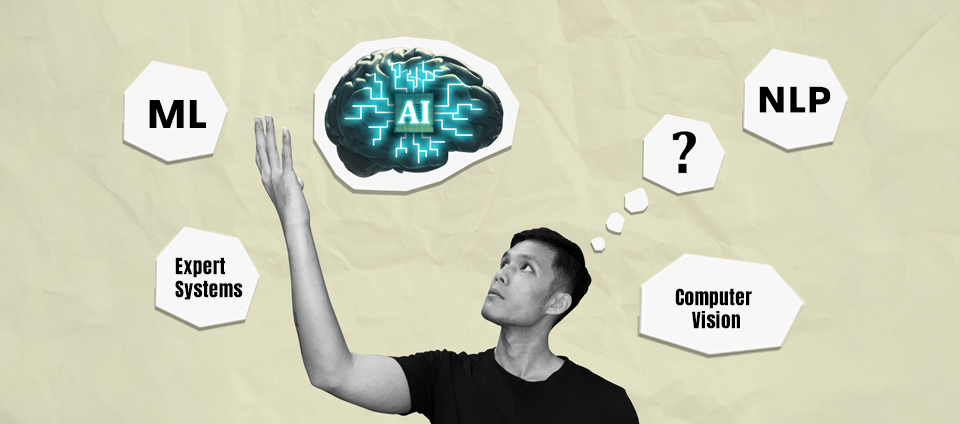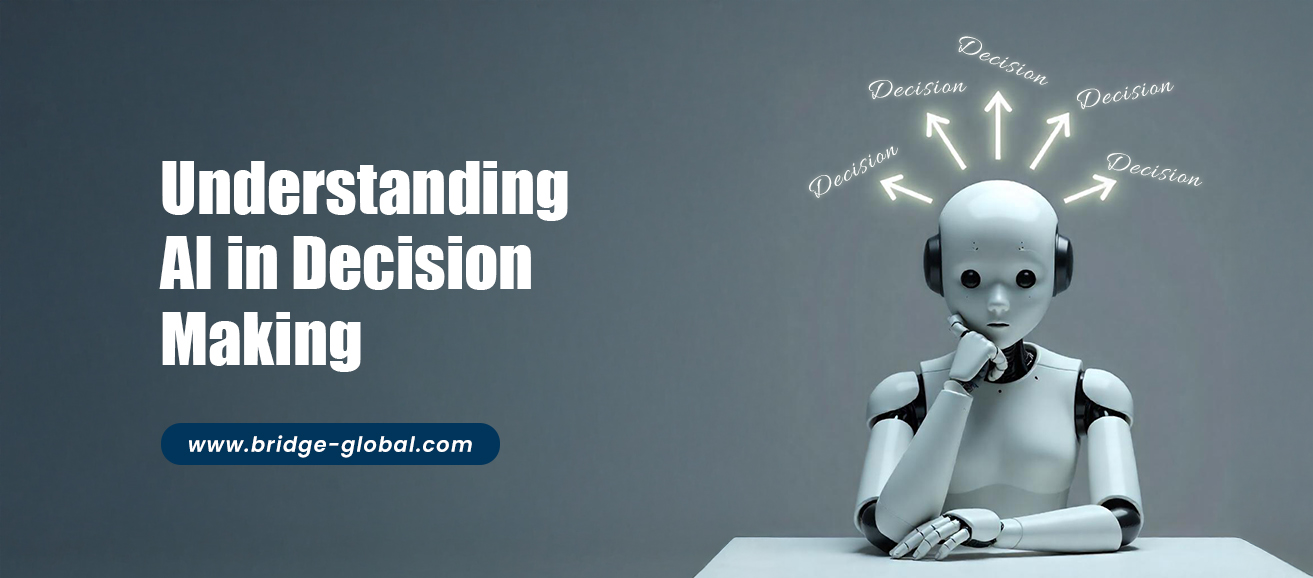AI in Decision Making Explained: Technologies Driving Smarter Outcomes
In today's fast-paced business environment, the need for informed, accurate, and timely decision-making is crucial for achieving success. Companies are leveraging AI to speed up this process by sifting through vast amounts of data to uncover patterns and determine the most effective actions. This technological advancement is transforming decision-making across all sectors.
The significance of AI in decision-making cannot be overstated. AI not only mimics human decision-making capabilities but often surpasses them, especially in complex scenarios where choices are difficult. According to a recent survey by Gartner, 79% of corporate strategists believe that AI, automation, and analytics will be pivotal in driving business success in the coming years.
Let’s take a closer look at AI in decision making , its benefits, the key AI technologies used, and more!
What is AI in Decision Making?
Picture an intelligent system capable of analyzing vast amounts of data to make smarter, more informed decisions - that’s the power of AI-driven decision-making. AI systems analyze various types of information, including text, images, and sensor data. The algorithms employed can vary from simple rules to intricate neural networks that guide AI in analyzing data and drawing conclusions.
Machine learning enhances AI decision-making by allowing systems to learn from previous data and outcomes, thereby refining their decision-making skills over time. This automation powered by AI enables businesses to make quicker and more precise decisions across diverse industries, including retail, finance, and telecommunications.
AI excels at handling messy and conflicting information, processing far more data than a human could manage, and effectively distinguishing meaningful signals from the mix. With machine learning, the results of each decision serve to train the system, leading to even better decision-making in the future.
AI Technologies Used in Decision-Making

Artificial intelligence (AI) offers a suite of powerful technologies that enhance decision-making by processing complex data, uncovering insights, and guiding informed actions. Key AI technologies commonly applied include:
Machine Learning (ML)
Machine learning enables systems to analyze large datasets, identify patterns, and generate predictions. By learning from historical data, ML supports trend analysis and outcome forecasting, helping decision-makers refine strategies and anticipate future scenarios.
Natural Language Processing (NLP)
NLP allows machines to understand and interpret human language, making it a vital tool in decision-making. It facilitates sentiment analysis, powers conversational interfaces like chatbots, and extracts insights from textual data - ultimately supporting more informed and responsive decisions.
Computer Vision
Computer vision technology interprets visual inputs from images and video to provide actionable insights. Through functions like image recognition and object detection, it supports decisions related to quality control, anomaly detection, and any processes that rely on visual data.
Expert Systems
Expert systems simulate human expertise within specific domains, using knowledge bases and inference engines to deliver recommendations. These systems are useful in specialized fields such as healthcare, finance, and legal services, offering guidance and solutions grounded in domain-specific knowledge.
Benefits of AI in Decision Making
1. Harnessing AI for Data Insights
Artificial Intelligence is remarkable at sifting through both structured and unstructured data to reveal insights and trends that might elude human analysts. For example:
- Predictive Analytics: AI can predict market trends, customer behaviors, and operational inefficiencies, enabling businesses to proactively address challenges and capitalize on opportunities.
- Personalization: Platforms such as Netflix leverage AI to study viewing patterns and suggest content, enhancing user engagement and satisfaction.
- Risk Management: AI-driven models evaluate risks in finance, cybersecurity, and supply chains by identifying anomalies and forecasting possible threats.
2. Streamlining Tasks with Automation
With a competent AI development company’s support, Artificial Intelligence is a game-changer when it comes to automating mundane and repetitive tasks, such as data entry, generating reports, and managing inventory. This automation gives more freedom to employees, allowing them to dedicate their time to more creative and strategic endeavors that contribute to the organization’s success. A prime example is Amazon, which employs AI to enhance its supply chain efficiency by predicting demand and optimizing stock levels, leading to substantial cost reductions and improved customer experiences.
3. Real-Time Decision Making
AI systems are designed to analyze and process data in real time, which equips businesses with the ability to respond swiftly to market fluctuations. This level of responsiveness is vital in dynamic industries like finance and retail, where even minor delays can result in lost revenue or diminished market presence. For instance, algorithmic trading platforms harness AI to execute rapid decisions, thereby maximizing profits while minimizing associated risks.
How AI Enhances Decision-Making Across Business Functions

Customer Experience
Customer information is abundant - found in emails, reviews, social media interactions, and chats. Tools powered by Artificial Intelligence, such as sentiment analysis and chatbots, can process this data in real-time, enabling you to make decisions that prioritize customer needs.
Finance and Forecasting
Artificial Intelligence models can analyze cash flow trends, foresee budget overruns, and even suggest investment plans. For instance, predictive analytics can identify potential late payments before they occur, allowing finance teams to proactively manage cash flow challenges.
Supply Chain Optimization
From anticipating inventory requirements to preventing shipping delays, Artificial Intelligence empowers operations managers to optimize the entire supply chain. It can evaluate vendor risks, oversee logistics, and predict demand, effectively reducing waste and minimizing delays.
Human Resources
The process of hiring and retaining employees can greatly improve with the help of AI. These advanced tools can efficiently sift through resumes, forecast potential employee turnover, and even recommend personalized upskilling opportunities for each employee.
Risk Management
AI is also essential in areas like fraud detection and cybersecurity. It can examine user behavior and identify unusual patterns, allowing for proactive measures to be taken before any damage occurs.
Role of AI in Decision Making
AI plays a vital role in improving the decision-making process by supporting different stages of the decision-making framework. Let's explore how AI contributes to each step of this process.
Identifying the Problem: AI helps define problems more precisely by analyzing large datasets to detect patterns, trends, or irregularities that may go unnoticed by humans. This data-driven insight ensures a clearer understanding of the issue and supports the formulation of specific, measurable goals.
Gathering Information: With its ability to rapidly process vast and varied data sources, AI plays a key role in collecting relevant information. Technologies like machine learning, natural language processing, and data mining allow organizations to extract meaningful insights, offering a more complete picture of the situation.
Identifying Alternatives: AI can explore a wide range of possible solutions by running simulations based on past data and predictive models. By analyzing trends, external influences, and historical performance, AI uncovers options and strategies that might not be immediately obvious to human decision-makers.
Assessing Alternatives: AI enhances the evaluation process by offering data-backed insights into the strengths and weaknesses of each option. Machine learning algorithms assess previous outcomes of similar decisions, predict potential risks, and forecast likely results, helping decision-makers weigh their choices more effectively.
Choosing the Best Alternative: Although the final call lies with human users, AI can recommend optimal choices based on comprehensive data analysis. These intelligent suggestions guide decision-makers toward more rational and evidence-based conclusions.
Reviewing Decisions: AI supports post-decision evaluation by monitoring real-time data and measuring performance against key benchmarks. It evaluates whether the decision is delivering the desired results and can propose refinements, or even make real-time adjustments to improve outcomes.
The Wrap
By utilizing Artificial Intelligence for insightful data analysis, automation, and real-time insights, organizations can break free from the constraints of conventional decision-making, reduce expenses, and foster innovation. The future of business is in the hands of those who adopt AI and harness it to generate value across all levels. You can effectively leverage the benefits of AI by partnering with an experienced and reliable AI development company that offers AI software solutions, generative AI development, AI integration, and more!



